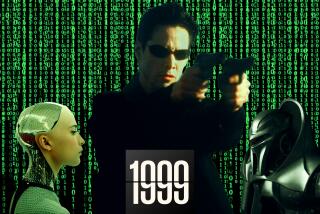Bold, Brainy Thriller ‘Pi’ Doesn’t Stick to Formula
That first-time filmmaker Darren Aronofsky calls his picture “Pi,” the symbol designating the ratio of the circumference of a circle to its diameter, suggests right away that it’s not going to be any ordinary science-fiction thriller. Indeed, it is a brilliant intellectual adventure that fans of bold independent filmmaking will want to experience, even though the ending is something of a letdown.
For the last decade, Aronofsky’s young hero, Max (Sean Gullette, an actor of formidable resources and concentration) has been attempting to decode a numerical pattern beneath the workings of the stock market. Holed up in a New York walk-up apartment that has become a computer labyrinth, Max is on the verge of a breakthrough. He’s also on the verge of a breakdown, shooting up or swallowing large amounts of medication to allay extreme panic attacks.
Worse yet, he’s been somehow tracked by a ruthless speculator (Pamela Hart) who will stop at nothing to tap into Max’s brainpower. What’s more, Max, a nonreligious Jew, has inadvertently attracted the attention of a young Hasidic Jew (Ben Shenkman), who tells him of the numerical significance of the Hebrew mystical doctrine the cabala, and whose rabbi (Stephen Pearlman) ultimately concludes that Max possesses the true name of God, the key to divine knowledge.
There’s no denying that the more mathematical skills you have, the more you will be able to get into this most unusual film better than those of us who are incapable of balancing a checkbook. But even we can grasp that, whether he realizes it or not, Max is ultimately on a spiritual journey, for “Pi” makes it increasingly clear that Aronofsky holds, as do many others, that science, nature and religion are ultimately in unity with one another.
Indeed, Max proceeds on three propositions of his own devising: 1) “mathematics is the language of nature”; 2) “everything around us can be represented and understood through numbers”; and 3) “therefore, there are patterns everywhere in nature.”
It’s not for nothing Aronofsky won a directing prize for “Pi” at Sundance, for his film is a work of dazzling bravura, shot by Matthew Libatique in a stunningly harsh, high-contrast black-and-white, exuding energy and pace, creating one compelling image after another. Yet for all his abundant talent, imagination and intellect, Aronofsky, who skillfully builds suspense interlaced with dark humor, hasn’t been able to overcome the paint-yourself-in-a-corner syndrome that afflicts far more prosaic films.
All along, he’s been tantalizing us with the possibility that Max has the ability to unlock the secrets of the universe, and naturally that’s a pretty tall order for any director to deliver. Yet Aronofsky might well have dared, at the moment of truth, to try to evoke a sense of the ineffable--a quality that emerges in the greatest moments of such profoundly spiritual directors as Robert Bresson, Carl Dreyer and Yasujiro Ozu. As it is, “Pi” folds its tent in such a way as to validate the sentimental notion expressed by Max’s mentor (Mark Margolis), “Life isn’t just mathematics.”
* MPAA rating: R, for language and disturbing images. Times guidelines: The film is too intense and complex for most youngsters.
‘Pi’
Sean Gullette: Maximillian Cohen
Mark Margolis: Sol Robeson
Ben Shenkman: Lenny Meyer
Pamela Hart: Marcy Dawson
Stephen Pearlman: Rabbi Cohen
Samia Shoaib: Devi
An Artisan Entertainment presentation. Writer-director Darren Aronofsky. Producer Eric Watson. Executive producer Randy Simon. Cinematographer Matthew Libatique. Editor Oren Sarch. Music Clint Mansell. Production designer Matthew Marraffi. Art director Eileen Butler. Running time: 1 hour, 25 minutes.
* Exclusively at the Nuart, 11272 Santa Monica Blvd., West Los Angeles, (310) 478-6379.
More to Read
Only good movies
Get the Indie Focus newsletter, Mark Olsen's weekly guide to the world of cinema.
You may occasionally receive promotional content from the Los Angeles Times.









